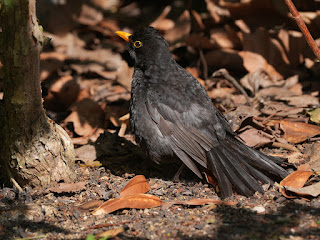A Wren regarded the camera gravely from a tree down the hill from the Round Pond.
Another was scolding a Magpie that had come near its nest when it was trying to bring food to its young. I had to film this while a police helicopter was clattering overhead and select the least noisy bits. The three Eurocopter EC 145s used by the Metropolitan Police must be the loudest for their size of any helicopter, and I wonder whether they were chosen deliberately for that reason to strike terror into the public.
A Robin near the Henry Moore sculpture was also scolding a Magpie that had come too close to its nest.
The familiar old male Chaffinch came to be fed in the chestnut tree by the Serpentine Gallery while I was unsuccessfully trying to find a Little Owl.
A Blackbird was sunbathing near Mount Gate, but I disturbed it and only got a shot as it stood up.
A Pied Wagtail high-stepped through the parched grass by the Round Pond.
A young Magpie near the Dell has already learnt how to shell a peanut.
Ahmet Amerikali got good pictures of a Reed Warbler near the Lido ...
... a female Blackcap near Peter Pan ...
... and a Mistle Thrush in the same place, eating a bird cherry beside a web spun by a moth. There are very few Mistle Thrushes in the park, though it has been a bumper year for Song Thrushes.
The fountain pool in the Italian Garden where a Coot had already nested and brought up eight chicks now has another new brood in it with six chicks. You can see the two sets of young together, and the parents weren't fighting when I was there. The four other large pools have also had Coot chicks hatched in them, so this is the fifth family this year. It's a very good place, free from pike and hardly visited by gulls, and the Coots know it.
The Coot nesting on the gravel strip in the Round Pond is still there ...
... but a few yards along the strip a Lesser Black-Backed Gull was looking at the nest hungrily.
The two larger Mandarin ducklings were staying fairly close to their mother, but the little one had wandered off by itself again. It's amazing that it has survived so long.
The Mallard ducklings were eating algae, watched by their mother. She looks proud and has every reason to be.
The four new Egyptian goslings were resting on the edge of the Serpentine at Fisherman's Keep, guarded closely by their parents because this area is full of Herring Gulls.
The summer concerts are about to start in Hyde Park, and it looks as if there has been another attempt to re-form T. Rex.
Yesterday I mentioned the attempt to eradicate bindweed in the Flower Walk. The battle is already lost.
As Horace wrote, Naturam expellas furca, tamen usque recurret -- You can drive out Nature with a fork, but she'll come racing back.





%202025%201a.jpg)
%202025%201a.jpg)
%202025%201a.jpg)






And thank God for that.
ReplyDeletePerhaps the spirit of Marc Bolan is hiding beneath that dinosaur costume.
I'm getting second hand anxiety with the escapades of the little Mandarin. God must have plans for it, otherwise it's miracle that it has survived so long.
Tinúviel
Seeing that bindweed growing up under the boastful notice almost made my day, though not quite as I couldn't find an owl.
DeleteI had to look up T.Rex (the group) as I know nothing about such things, and realised that every time I visit one of my nephews I go over the humpbacked bridge where Marc Bolan was killed. It would be a death trap for anyone driving too fast.
That little Mandarin really worries me too.
Maybe the Mandarin duckling has a flair for dive-dodging.
ReplyDeleteI wonder if Mistle Thrushes are being more severely affected by Usutu than Song, which have become net beneficiaries of it. Now into the second year of a bumper crop of netting-free raspberries in north London, and even the wild throwbacks in a more open part of the same garden (which can't be picked cleanly) get left alone. Jim
I don't think the Mandarin ducklings dive, at any rate not routinely, while the Mallard ducklings dive the whole time. Maybe in an emergency.
DeleteRemarkable about your raspberries out in the open. Don't parakeets like them?
The local parakeets don't venture down where there are many high trees. This may be wise, as many Woodpigeons seem to have been killed by Sparrowhawk(s) in the vicinity. Jim
ReplyDeleteWho would eat a parakeet when a much larger and juicier Wood Pigeon was on offer? I'm surprised, though, that the Sparrowhawks are taking such large prey. A female Sparrowhawk can just lift a Feral Pigeon, and a male can't and has to eat it on the spot or drag it into the bushes.
DeleteSeveral times I've found telltale piles of feathers in the locale and once disturbed a female Sparrowhawk off a Woodpigeon carcass in the same garden, removed most probably by a fox within a day. These foxes are fast learners. I suspected several squirrels and then a magpie of being poisoned, but I had to dispose of the magpie myself a foxes just left it intact. Jim
DeleteAfter the foxes just left it intact for two whole days. Jim
DeleteClever foxes could smell and recognise poion?
Delete